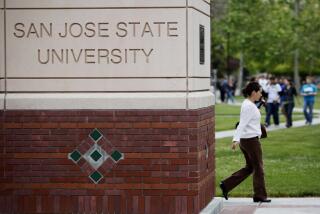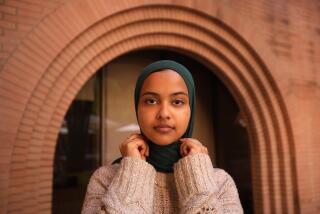Another Voice of Academia Is Silenced in Iraq
- Share via
BAGHDAD — They buried Abdul Latif Mayah on Tuesday, and with him, many academics’ hopes for intellectual freedom in the new Iraq.
Gunned down only 12 hours after advocating direct elections on an Arab television talk show, Mayah was the fourth professor from Baghdad’s Mustansiriya University to be killed in the last eight months, his death the latest in a series of academic slayings in post-Hussein Iraq.
“His assassination is part of a plan in this country, targeting any intellectual in this country, any free voice,” said Salam Rais, one of Mayah’s students. “He is the martyr of the free world.”
Tuesday, many academics acknowledged that the killers had succeeded in their campaign of intimidation.
“After the assassination of Dr. Abdul Latif, we feel that all of us are targeted,” said Ahmed Arrawi, a colleague of Mayah. He said he and other academics would think twice before making controversial statements.
Professors and hundreds of students, many of them sobbing, joined Mayah’s funeral march Tuesday as his coffin was carried through the campus of the university where he was director of the Institute for Arab World Research and Studies. Mourners beat their heads and howled in despair, chanting, “There is no God but Allah.”
Mayah’s wife held aloft a weathered photograph of her gray-haired husband and wailed to his coffin: “You are a martyr! Your coffin is covered with the flag of our country!”
Attacks on Iraqi professors strike at one of this war-torn country’s last remaining symbols of pride. Its university system was the envy of the Arab world in the 1950s and ‘60s. Despite nearly three decades of repression by Saddam Hussein, higher education here is still viewed with great respect.
“In the same way that the ransacking of the [National] Museum went to the heart of many Arabs, this will hit them in the same way,” said Rachel Bronson, an analyst at the Council on Foreign Relations in New York. “It just adds to this sense of helplessness and hopelessness.”
Students and colleagues said Mayah was an enthusiastic teacher whose seminars often extended off campus. He used his own money to buy computers for his classroom. After Hussein’s ouster, he grabbed the family gun to fend off looters at the university. He insisted that classes continue during the war and after, and gave his finals on schedule.
Despite Mayah’s impromptu stint as an armed campus guard, he spoke of the need for peaceful, deliberate government. One of his favorite sayings, colleagues said, was “Let the language of the gun die forever, and let us follow the language of democracy.”
He spoke optimistically about Iraq’s future, but in recent weeks had been troubled by the continuing disorder.
Mayah, whose friends said he was 54, was a longtime pro-democracy activist who had been jailed by Hussein after calling for elections in 1996. He had received anonymous death threats for several weeks, friends and family said, and began traveling with a bodyguard.
As he drove to work Monday, his Mitsubishi sedan was stopped by unidentified men. Mayah, the bodyguard and a colleague were ordered out of the vehicle. The gunmen opened fire only on Mayah, and he died at the scene. One local media report said he was shot 32 times.
People are slain for many reasons in Iraq, and it is often hard to determine motive because the killers are rarely caught. Professors have been at risk from the various sides battling for power in Hussein’s wake.
The night before he was slain, Mayah was a guest on a talk show on the Al Jazeera channel, where he supported a call by Grand Ayatollah Ali Sistani, Iraq’s leading Shiite Muslim cleric, for free elections by June 30, when the U.S. is scheduled to return sovereignty to Iraq.
Thousands have marched to support the cleric’s call, including at a demonstration Tuesday in Baghdad. Wire services reported other demonstrations in the southern cities of Basra, Najaf and Karbala.
In calling for quick elections, Mayah was opposing the United States, which has proposed a caucus system to choose the country’s new leaders.
Mayah, a Shiite and a former low-level member of Hussein’s Baath Party, “was supporting Sistani,” said Jabber Habib, a political scientist at Baghdad University. “Had he not supported Sistani, he would have been killed by the other side.”
Habib, a prominent commentator, said Mayah’s slaying has made him reconsider his own regular television appearances.
The killings of the three other Mustansiriya professors came amid anonymous notes left on campus warning members of the outlawed Baath Party that they faced execution. In the northern city of Mosul this month, the dean of a local university’s political science department was slain, an attack seen as the work of Baathists against someone they viewed as a collaborator in the U.S.-led occupation. Some Iraqis say there was no obvious motive behind the killing of another academic, an engineering professor, in Basra last year.
Iraq’s insurgents -- largely Sunni Muslims and Hussein loyalists -- are among the suspects in Mayah’s slaying. The Sunnis feel threatened by the majority Shiites’ call for direct elections.
Mayah’s mourners suggested there was a foreign element to his killing but offered no details. A banner carried at the head of the funeral procession blamed “America and the Zionists.”
Other students and professors at Mustansiriya University say they were at a loss to imagine who might have killed Mayah.
“Why such fear of an idea?” asked Kasim Fellahi, a colleague.
Rais, Mayah’s student, said his professor saw good things ahead for Iraq.
“He was optimistic,” Rais said. “Always optimistic.”
*
Researcher Raheem Salman of The Times’ Baghdad Bureau contributed to this report.
More to Read
Sign up for Essential California
The most important California stories and recommendations in your inbox every morning.
You may occasionally receive promotional content from the Los Angeles Times.













